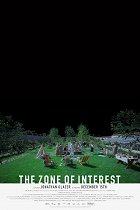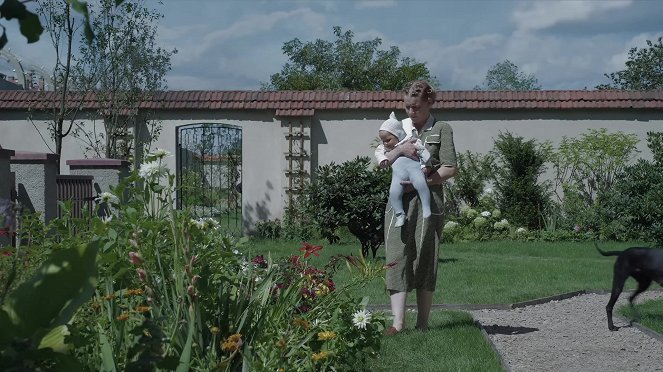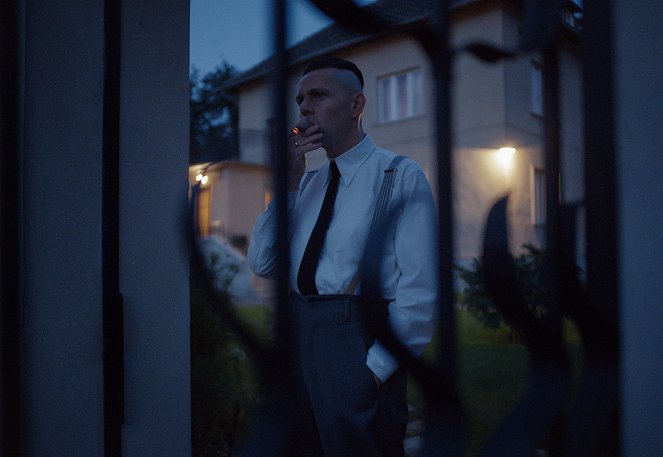Directed by:
Jonathan GlazerScreenplay:
Jonathan GlazerCinematography:
Łukasz ŻalComposer:
Mica LeviCast:
Sandra Hüller, Christian Friedel, Ralph Herforth, Freya Kreutzkam, Max Beck, Ralf Zillmann, Imogen Kogge, Stephanie Petrowitz, Marie Rosa Tietjen (more)VOD (4)
Plots(1)
The commandant of Auschwitz, Rudolf Höss, and his wife Hedwig, strive to build a dream life for their family in a house and garden next to the camp. (SF Studios Fin.)
Videos (4)
Reviews (11)
Yes, I understand that Jonathan Glazer wants to be different and make the usual stuff at least a bit special, and yes, I understand that he wants to experiment, but at what cost, for God's sake? Because this is a very soporific film without a single minute worth praising, and it is without question the worst 100 minutes of my life. Nothing happens at all, and the concentration camp connection is only on paper, as we don't get a single look behind the walls of the main Nazi's house, we don't get a single shot of Auschwitz, and all we get are occasional sounds and gunshots. I've never been so bored in a cinema, and realistically watching people fidgeting around, waiting for the end credits and looking at their watches every five minutes was far more entertaining than the film itself. This for me is a total waste and a wannabe arthouse pseudo-film that offers nothing at all, really nothing at all. If anyone praises this, I want whatever they are taking that made them flip out on while watching, otherwise I absolutely cannot explain why anyone would praise this shit. I understand that the director wanted to offer a view of the subject matter from the side of Nazis as "regular people", but I could have read this in one sentence and not had to watch 100 minutes without any technical, filmmaking or acting value added. Because if someone serves us literally eight minutes of a scene where the wife talks about her kohlrabi grows, or the final five minutes with a cleaning lady sweeping the floor in the camp, and deems it a thing worthy of admiration on screen, there must be something really wrong. Now, come on, you drooling critics.
()
Scenes from National Socialist married life and a film whose concept is drawn so tight that it left me feeling oddly indifferent. The idea of transforming a death factory into a 2D backdrop, which Łukasz Żal’s camera literally pushes through the depth of field to the Hösses’ “garden of paradise” is suffocating and oppressive, but it also leads to a certain monotony and risks making the viewer get used to it just as the characters get used to the ubiquitous stench, screaming and moaning. The central couple cannot be humanised to a sufficient extent to form a psychological counterpoint to the horrors of the Holocaust, so I found that there was something mechanical in the Hösses’ routines that made it easier for me to disconnect from the urgency of Glazer’s world. The banality of evil is precisely and literally illustrated. I was reminded of Markus Schleinzer’s similarly conceived and distanced film Michael, which, however, started to be truly impressive at the moment when the character of the blasé paedophile rapist gets an adversary in the form of the victim in a powerful reverse shot. Glazer chooses a similar principle at the end, but in doing so, he breaks the fourth wall in a way that has more intellectual calculation than natural power. Was Höss aware of the moral implications of his actions or was he able to conceal them in the rhetoric of industrial production and historical necessity? This is where the possibilities of Glazer’s film reach their limit. In the ever-powerful deluge of “Holocaust porn”, The Zone of Interest is important for its differentness and its courage to change the perspective, to expose the viewer to the “cognitive dissonance” experienced by the direct perpetrators of evil. It is also an interesting reflection on the central ideological concept of Lebensraum, which in the portrayal of Frau Höss takes the form of a neat garden fertilised with the ashes of the dead. Nevertheless, I enjoy reflecting on the film from a distance significantly more than experiencing it directly on the screen. In that respect, I give preference to the concept of Son of Saul…and to reading the immensely monstrous The Kindly Ones, which went much deeper into the psyches of the architects of the Holocaust than The Zone of Interest.
()
Auschwitz without the gunfire, the wailing and the dying. An original premise, where a lot can be invented, but where there is also a constant risk of boredom without emotions. Jonathan Glazer comes up with a version that in regular intervals shows ideas to illustrate a typical day of the head honcho of the concentration camp at the gates of Auschwitz. Although there are no downright deaf spots, as a whole, however, the film, in all its ordinariness, fails to be fully engrossing. All credit goes only to some excellent scenes, notably the Sunday fishing or the imprisonment in the greenhouse.
()
Such is the daily routine of a family of ordinary, decent citizens. They grow kohlrabi and carnations in the garden, keep the house in perfect order, pet the dog and frolic in the swimming pool, and all this is provided by the head of the family, who goes to work every day in an exemplary manner and who - by the way - is the director of the most monstrous concentration camp. He is, again by the way, at work dealing with, for example, the more efficient incineration of Jews in ovens, and does it with the same emotional involvement as when you and your wife are deciding what to buy for dinner at the supermarket. And behind the walls of this middle-class family's property, behind those ominous walls, is a human-scale Mordor where the most monstrous acts against humanity are taking place, and you feel an immense oppression thanks to the ingenious sound work and the ominous visual details in the distance, such as the smoke from the ovens, or from the locomotives bringing in more and more human fuel. The film doesn't shove down your throat horrific imagery about how monstrous the Holocaust is, it does it on a subliminal basis, working with your subconscious, and that actually makes it all the worse. It made me sick, but at the same time I bow down to Jonathan Glazer for this bold cinematic experiment that says more about us humans than you'd expect.
()
The Zone of Interest depicts the concentration camps and the Holocaust from a truly novel point of view, and this is why it will not be lost among the thematically close films. Jonathan Glazer's film does not primarily target the audience's eyes, but rather their ears and general awareness of the horrors of war: at first glance we see the ordinary life of an ordinary family, but on second viewing (or listening) and placing the film in the context of the time, it evokes extremely uncomfortable feelings. On the one hand we have an idyllic, almost 'Garden of Eden', on the other (behind the fence) we can hear screams and gunshots, while in the distance we watch the smoke (of death). To the sound of a sometimes literally poignant musical score, we witness that pure evil can take on a completely mundane, innocent form. As in Anatomy of a Fall, Sandra Hüller gives a supremely impressive performance and I'm curious to see what roles await her in the future. Last but not least, I praise the play with negative imagery, which contributed to the film's unpleasant atmosphere. Perhaps only the closing documentary insert left me with mixed feelings.
()



Ads